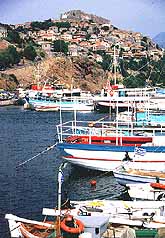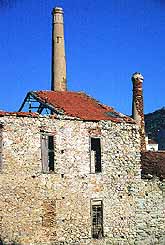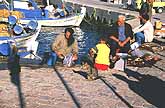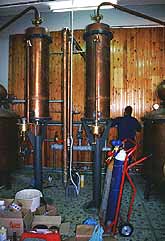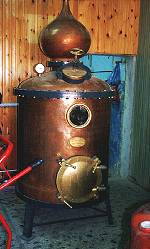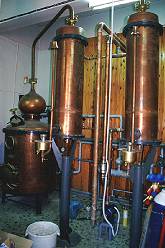| LESVOS
CULTURAL HISTORY
AS this island is mainly a cultural island, something that one
cannot help noticing when visiting it, it is worth while putting down a few
words concerning its cultural history and its
contribution to world culture generally.
AS early as the 7th century BC the island's cultural
development was one of the most important in the Hellenic World. Music and
poetry were very popular on the island. So we have :
Terpandros from Antissa in 710 BC. A poet and a
musician, he won musical contests in Sparta and Pythia. He first created lyric poetry and
he added the 4th and 7th string to the lyra. According
to legend when the waves brought the head and lyra
of Orpheus ashore in Lesvos, the lyra was given to
Terpandros .Thus mythology and history were joined in
the personality of a great poet who was to be the
patriarch in a chain of great poets.
Arion from Mythimna, a musician and poet , was born in the
7th century BC. He
was famous and rich. So according to legend
(Herodotus tells this story) whilst returning from Italy
the sailors conspired to throw him into the sea in order
to rob him. Arion requested to play his lyra for the
last time. Hearing the magic of his music the dolphins
gathered around the boat and when Arion was thrown into
the sea the dolphis saved him by taking him ashore near
Taenaron (in Laconia).
Alkaeos from Mytilini about 640 BC came from the
aristocratic family of Penthildae descendants of Orestis. Amongst the poems that
were saved : "We must not let sorrow in our souls, as
feeling sorry we can go nowhere, Vakhi. Let us have some
wine which is the best medicine for a sorrowful heart."
Sappho, called the 10th muse. She was born in Eressos by the end of the 7th century BC. She was a great lyric poetress who worshipped Aphrodite and put music into her
poetry. She taught young girls singing, music, and
dance. All her poems are devoted to love and
beauty. According to legend she comitted suicide when
she was on the island of Lefkas, because her love for a handsome
sailor Faonas was not returned. Sappho was immortalised
not only through her poems but also in paintings both in
ancient and modern times that she inspired.
Frinis and Aginor (5th and 4th centuries) were both from
Mytilini and very well known in classical times for their music.
Koition from Mytilini, Telesis from Mythimna and Loggos
100-200 AD, who wrote the well known Daphnis and Chloe.
Pittakos, considered in antiquity one of the 7 most
important philosophers, and also the philosophers Fanias, Kratippos and famous
Theofrastos from Eressos born in 372 BC and a pupil of
Aristotle and his appointed successor. He was a
great philosopher, believed deeply in God, was against
animal and human sacrifices, and considered thought to
be the servant of wisdom. Contrary to popular beliefs at
the time, he believed that a philosipher should partake
and enjoy all good things in life without, however,
exaggeration.
The historians Ellinikos, Myrsillos and Ermias.
The advocates Aeschinis, Potamon and the list is
inexaustible.
During the Christian era the Lesbians were given new
arenas such as
religious architecture, icon paintings and woodcarving --
mainly in monasteries and churches. It is worthwile visiting the churches and monasteries of the early
Christian and Byzantine period for all the artistic
temperament of the Lesbians was expressed through
religion.
In the last two centuries there have been at least 65
Lesbian poets and writers, amongst them the well known Argyris Eftaliotis from Eftalu near Mythimna, Stratis Myrivillis (panagia
gorgona), and Lesvos was the place of residence of Ilias Venezis, and the
origin of Odysseas Elytis. The famous painter Theofilos and the art lover Eleftheriades-Terriant.
In Lesvos today festivals with plays, music, exhibitions
and other cultural events are continuously organised and the intellectual, artistic and
cultural level is the highest of the islands.
More about Lesvos
|
|
